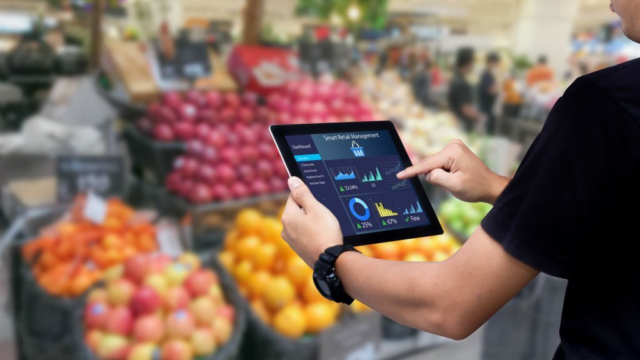
How Agriculture Is Utilizing Field Service Management Software

In today’s fast-paced world, it’s no surprise that technology is making its way into every industry - and agriculture is no exception. As farmers continue to look for ways to streamline their operations and improve productivity, they’re turning to field service management software (FSMS) as a game-changing solution.
This powerful tool has the potential to revolutionize how agricultural businesses operate, increasing efficiency while also reducing costs. But what exactly does FSMS do, and why is it such a valuable asset for those in the agricultural sector?
In this article, we’ll dive deep into the world of field service management software and explore how these innovative systems are transforming modern farming practices. We’ll discuss key features you should look for when choosing an FSMS platform, as well as real-life examples of how this technology is being utilized by farms across the globe.
So buckle up – we’re about to take you on an exciting journey through the cutting-edge intersection of agriculture and technology!
Streamlining Communication And Scheduling
In today’s fast-paced agriculture industry, effective communication and scheduling are crucial for the success of any farm operation. This is where agriculture management software comes in handy.
By integrating a modern farm management system into their daily workflow, farmers can streamline various field operations, such as planting, harvesting, and field monitoring. With all these tasks unified under one platform, it becomes significantly easier to manage resources, track progress in real-time, and make data-driven decisions that ultimately lead to increased productivity.
A robust agriculture management software not only helps with streamlining communication between team members but also assists farmers in efficiently scheduling their field work according to weather forecasts or available resources. The use of advanced technology like sensors for field monitoring offers valuable insights on soil health, crop growth patterns, and other essential variables – all accessible through a user-friendly interface.
As a result, this comprehensive approach ensures that farming teams remain connected throughout the entire cultivation process while enabling them to optimize processes at each stage for maximum yield potential.
Improving Productivity And Efficiency
As the sun rises and sets, so does the world of agriculture constantly evolve. In a bid to keep up with these changes, agricultural operations have increasingly turned to field service management software for improving productivity and efficiency in various aspects of their work.
Farm management software has revolutionized how field activities are planned and executed by providing precise crop management solutions that enhance decision-making processes. With the integration of precision agriculture technologies such as GPS-guided machinery, sensors, and drones, data management becomes seamless, allowing farmers to monitor soil conditions, weather patterns, and other factors affecting their crops in real-time.
Production efficiency is thus improved through optimal resource allocation for tasks like planting, irrigation, fertilization, pest control as well as harvesting. The synchronization between data analysis capabilities within these software tools not only saves precious time but also promotes environmentally sustainable farming practices.
Enhancing Safety And Compliance
As the agriculture industry continues to grow and evolve, so does the need for effective risk management strategies.
One way that farm management software is helping with this important aspect of agricultural operations is by enhancing safety and compliance measures in a variety of ways.
By incorporating field performance data into these systems, farmers can easily monitor and adjust their practices to ensure they are meeting regulatory requirements while also minimizing potential hazards on the job site.
Precision farming techniques have become increasingly popular as a result, allowing producers to optimize their use of resources such as water, fertilizer, and pesticides in order to reduce both environmental impact and worker exposure.
This focus on safety and compliance extends beyond just field work; it also encompasses all aspects of an operation’s logistics chain.
Field service management software provides essential tools for tracking equipment maintenance schedules, managing employee training records, documenting incidents or near-misses in real time, and even automating certain processes like pesticide application through advanced drone technology.
These capabilities not only support ongoing efforts towards greater efficiency within the sector but also demonstrate a commitment to promoting responsible stewardship─a critical component of any successful precision farming strategy.
Optimizing Inventory Management

In today’s competitive agricultural sector, effective farm management plays a vital role in ensuring high-quality produce and sustainable farming practices.
One of the key components in successful farm planning is optimizing inventory and livestock management. With the rapid technological advancements, many agriculture solutions providers have developed specialized agricultural software to help farmers better manage their resources.
Farm management tools with built-in inventory management modules offer numerous advantages for modern farms. These agriculture software systems enable farmers to efficiently track and manage stocks of seeds, fertilizers, pesticides, machinery parts, and other essential supplies required for smooth farm operations.
By streamlining this process through automation and real-time data analysis features, these digital solutions can significantly boost productivity by helping farmers make informed decisions on resource allocation while minimizing waste and maximizing profits.
Automating Quality Control Measures
Incorporating field service management software into agriculture practices has led to significant advancements in automating quality control measures. With the help of farm management software for farmers, they can now ensure that every aspect of their operations is running smoothly and efficiently. This not only helps them maintain a high standard of crop quality but also allows them to make better-informed decisions based on real-time farm data.
A comprehensive farm management solution offers features like crop planning, field mapping, record-keeping, and much more.
1. Crop planning: Farm management software enables farmers to plan their crops meticulously by taking into account factors such as soil type, weather conditions, and pest presence.
2. Field mapping: Accurate maps are generated with geographic information systems (GIS) technology, allowing farmers to analyze fields at a granular level and identify potential problem areas.
3. Record-keeping: Software solutions offer efficient ways of keeping track of essential data related to planting schedules, fertilization programs, harvest dates, and other crucial information.
4. Decision-making support tools: The software provides valuable insights through advanced analytics capabilities which aid farmers in making informed choices regarding resource allocation or addressing any issues that may arise during the growing season.
The integration of these automated quality control measures has revolutionized traditional farming methods while providing tangible benefits for both small-scale and large commercial farms alike. By embracing this innovative approach to farm management, today’s agricultural professionals are paving the way towards a sustainable future where higher yields are achieved using fewer resources - all thanks to cutting-edge technologies available at their fingertips.
Facilitating Data Analysis And Reporting
It’s no coincidence that as the sun sets on another day of hard work, farmers can still find solace in knowing their agricultural activities are being efficiently managed by innovative technology.
This sense of relief comes from farm management software that helps store and manage essential data in one place, streamlining the process for better decision-making.
A crucial component to this newfound efficiency is facilitating data analysis and reporting.
This modern approach enables farmers to harness powerful management tools with ease, allowing them to optimize and manage farm operations effectively.
By incorporating real-time data into analytics programs, these digital solutions offer insights into crop health, soil conditions, weather patterns, and other vital factors that influence overall productivity.
As a result, the agriculture industry has become more proactive than ever before when it comes to increasing yields while preserving valuable resources.
The ability to quickly access accurate information empowers today’s farmer with a strategic advantage – paving the way for sustainable success in an unpredictable world.
Efficient And Systematic Manangement Work Orders
Efficient and Systematic Management of Work Orders
The use of agriculture software has revolutionized the way farm owners manage work orders, leading to more efficient and systematic management. Farm management and tracking have become increasingly important as farms grow in size and complexity, requiring a higher degree of organization for optimal productivity.
Field service management software enables farmers to streamline their farm operations by automating tasks such as scheduling, dispatching resources, tracking progress, and even invoicing clients. This not only saves time but also allows farm staff to focus on other essential aspects that contribute to increased yield.
One significant advantage of field service management software is its ability to provide real-time updates on work order status. With these live updates, farm owners can easily track the progress of various tasks assigned to their workforce while ensuring timely completion. In addition, this technology helps prevent any bottlenecks or delays in production by identifying issues before they escalate into larger problems.
Overall, adopting field service management software empowers farmers with crucial insights that enable them to make data-driven decisions that improve overall operational efficiency and maximize profitability.
Analyzing Weather Conditions
Analyzing weather conditions has always been a critical aspect of agriculture, as it directly impacts crop growth and yield. With the development of field service management software and farm management software, farmers can now access advanced tools that facilitate precision and sustainability in their agricultural practices.
These modern software solutions are specifically designed for farmers to manage their operations more efficiently while taking into consideration various factors such as soil health, pest control measures, irrigation systems, and most importantly, weather conditions.
The integration of mobile apps with these farm management software adds another layer of convenience for farmers by allowing them to monitor and analyze weather data on-the-go from their smartphones or tablets. By utilizing this technology, they can receive real-time updates about temperature fluctuations, humidity levels, precipitation forecasts, wind patterns, among other essential attributes that influence farming activities.
As a result, farmers are empowered to make well-informed decisions regarding planting schedules, harvesting times, and overall farm maintenance strategies based on accurate meteorological information provided through field service management software platforms. This ultimately leads to improved productivity levels and enhanced environmental stewardship in the agricultural sector.
Leveraging Gps Technology

There has been a theory that leveraging GPS technology in agriculture can lead to increased efficiency and productivity, but is there any truth to this notion? As the industry continues to evolve and adopt new technologies, field service management software solutions are becoming more sophisticated. By incorporating GPS technology into these systems, farmers have access to advanced mapping and planning tools which not only improve their daily operations but also contribute significantly towards sustainable farming practices.
Let’s take a closer look at how agricultural professionals can capitalize on GPS-enabled farm management apps:
1. Precision Agriculture: Leveraging GPS technology allows for precise application of seeds, fertilizers, and pesticides based on accurate field maps. This leads to better resource utilization and reduced environmental impact.
2. Field Scouting & Monitoring: Farm management apps with GPS capabilities enable real-time monitoring of crop health, growth stages, pest infestations, and other critical factors ensuring timely interventions when needed.
3. Resource Planning & Allocation: With accurate mapping information provided by GPS-enabled field service management software solutions, farmers can efficiently plan equipment usage, labor allocation, irrigation schedules as well as make informed decisions about crop rotations.
4. Yield Forecasting & Marketing Strategy: Advanced data analytics combined with geospatial information gathered through GPS technology help predict future yield levels allowing farmers to develop targeted marketing strategies for optimum profitability.
By integrating GPS functionality within field service management software applications designed specifically for agriculture use cases such as mapping fields or creating customized work orders tailored around individual farmer needs - it becomes evident just how much potential exists when combining modern-day technological advancements alongside traditional farming methods aimed at achieving long-term success within an ever-changing global marketplace environment without compromising our planet’s finite resources along the way.
By integrating these innovative solutions and time-tested practices, we can create a sustainable agricultural system that not only meets the growing demand for food but also preserves and enhances the environment, supports local economies, and fosters healthier communities for generations to come.
Boosting Roi And Profitability
Building upon the advantages of GPS technology, field service management software takes agricultural operations to new heights by streamlining processes and improving overall efficiency. As a result, farmers are better able to manage their resources and optimize crop production cycles.
By utilizing farm management software, agriculture businesses can experience significant benefits in boosting ROI and profitability. Field service management solutions enable real-time data analysis, which allows for informed decision-making throughout the entire supply chain.
From planting schedules to inventory control, these digital tools help reduce waste while maximizing output. Furthermore, integrating such software into daily operations provides valuable insights that drive continuous improvement efforts across all aspects of agricultural operations.
This holistic approach not only enhances productivity but also contributes to more sustainable farming practices for long-term success in the industry.
Conclusion
In conclusion, the agricultural landscape has truly transformed with the integration of field service management software.
As a thriving quilt of innovation and growth, this technology weaves together essential aspects like communication, productivity, safety, inventory control, work orders, weather analysis, GPS tracking and overall profitability.
As farmers navigating these ever-changing times in agriculture, embracing such cutting-edge solutions is not just smart business - it’s vital to ensuring our fields continue to flourish for generations to come.
Related Posts

Try Now
ServiceFolder's field service scheduling software free plan is perfect for small businesses with up to three people or less. It includes time tracking, scheduling, and mobile app features that make it one of the best mobile field service management software solutions for small businesses available. It is perfect for any small business company within the field service industry that wants to use technology to increase performance and productivity.